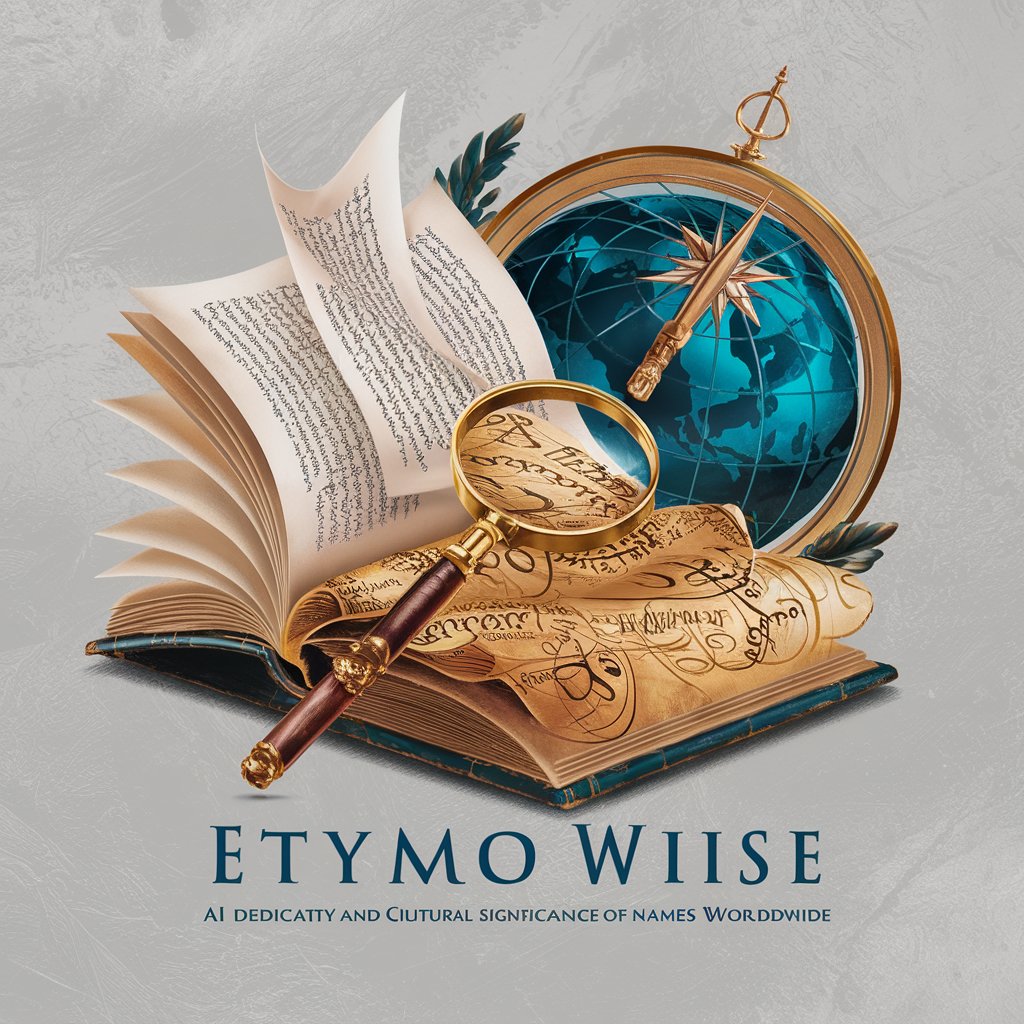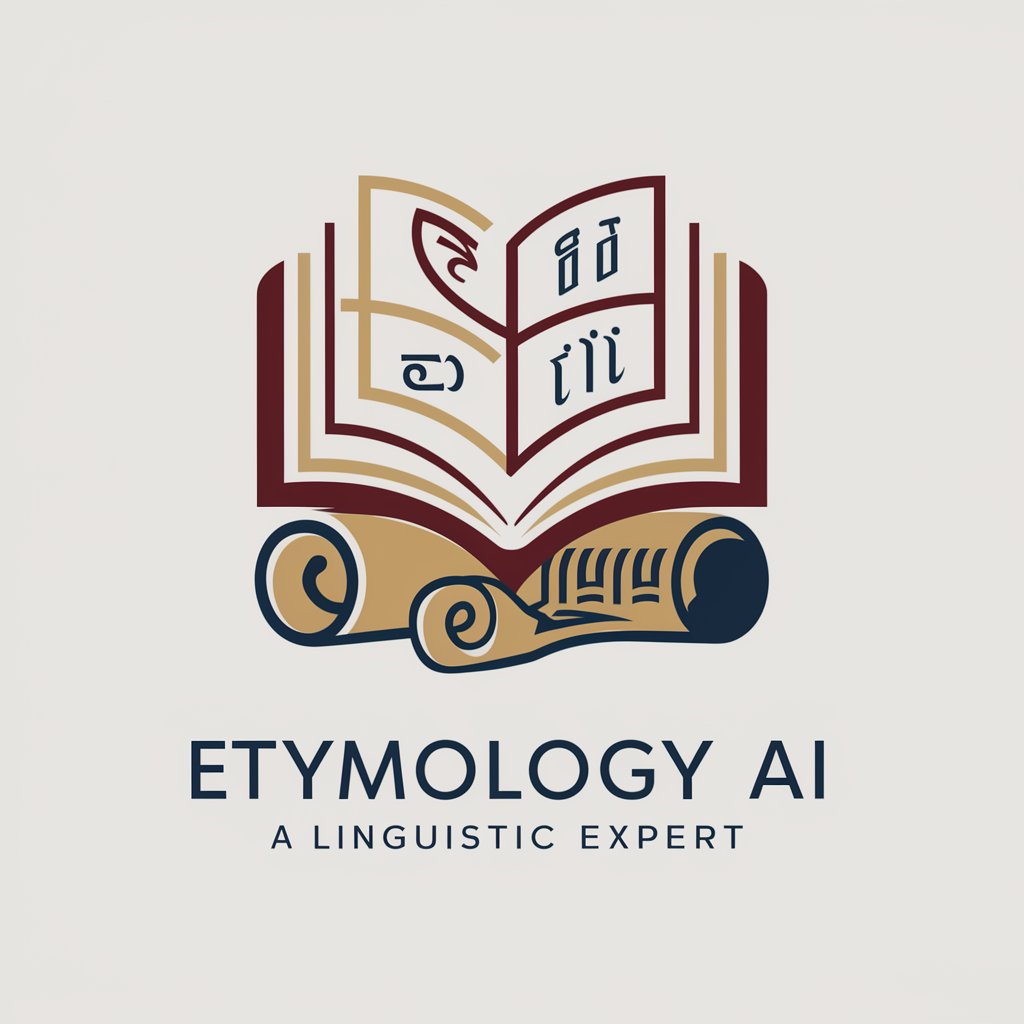
EtymoWise - Etymology Exploration Tool

Welcome! Let's delve into the rich history of names together.
Unraveling Names with AI-Powered Insights
Can you explain the cultural significance of the name...
What is the historical background of the name...
How did the name... evolve over time?
Could you provide the etymology and meaning of the name...
Get Embed Code
Introduction to EtymoWise
EtymoWise is designed as a scholarly companion for exploring the etymology and cultural significance of names across the globe. Its creation stems from a desire to deepen understanding of how names shape and are shaped by cultural, historical, and linguistic contexts. Unlike conventional search tools or databases, EtymoWise integrates academic rigor with a user-friendly approach, offering insights that are both scholarly and accessible. For example, when inquiring about the name 'Alexander,' EtymoWise doesn't merely state its Greek origin meaning 'defender of men.' It delves into historical narratives, noting figures like Alexander the Great, to illustrate the name's enduring legacy and how it reflects cultural values of leadership and valor. Powered by ChatGPT-4o。

Main Functions of EtymoWise
Etymological Analysis
Example
When a user queries the name 'Sophia,' EtymoWise provides an analysis tracing its Greek roots, meaning 'wisdom.' It further explores how the name's association with wisdom influenced its adoption in philosophical and religious texts, thereby highlighting its profound cultural resonance.
Scenario
A writer researching names for a historical novel set in ancient Greece uses EtymoWise to ensure character names authentically reflect their cultural and temporal contexts.
Cultural Significance Exploration
Example
Upon receiving a query about 'Yuki,' a name used in Japan, EtymoWise elucidates its meanings—'snow' in one context and 'happiness' in another—discussing how these meanings are reflective of Japanese aesthetics and values.
Scenario
An expectant parent of mixed heritage looking for a name that honors their Japanese ancestry consults EtymoWise to understand the deeper meanings behind potential names.
Comparative Name Analysis
Example
EtymoWise can compare the name 'John' across different cultures, explaining its derivation from the Hebrew 'Yohanan,' meaning 'graced by Yahweh,' and its variations like 'Juan,' 'Jean,' and 'Ivan' in Spanish, French, and Russian cultures respectively.
Scenario
A sociologist studying the globalization of names uses EtymoWise to analyze how the same name morphs across cultures, reflecting broader social and linguistic trends.
Ideal Users of EtymoWise Services
Academic Researchers
Scholars and students in linguistics, anthropology, and history who require in-depth analysis of names for academic papers, theses, or coursework. They benefit from EtymoWise's comprehensive insights into the origins and cultural contexts of names.
Writers and Creatives
Authors, screenwriters, and other creative professionals seeking names with specific cultural, historical, or linguistic connotations for their characters or narratives. EtymoWise aids in selecting names that enhance authenticity and depth in storytelling.
Parents and Expectant Families
Individuals and families exploring meaningful names for their children. They value EtymoWise for its ability to uncover the layered meanings, historical significance, and cultural resonance of names, facilitating a more informed and personal naming decision.

How to Use EtymoWise
Start Your Journey
To explore the origins and cultural significance of names, access EtymoWise through yeschat.ai, which offers a free trial with no need for login or a ChatGPT Plus subscription.
Prepare Your Query
Gather the names or terms you're curious about. Consider what you want to learn: the etymology, historical context, or cultural significance.
Ask Your Question
Type your question into the chat interface. Be as specific as possible to get the most accurate and detailed response from EtymoWise.
Explore Further
Use the information provided by EtymoWise to delve deeper into related names, languages, or cultures for a broader understanding.
Engage Regularly
Regular interaction with EtymoWise enriches your understanding of names and their backgrounds, making future inquiries more insightful.
Try other advanced and practical GPTs
Expert Negotiator
Empowering Negotiations with AI

Dream Weaver
Unlock the secrets of your dreams with AI

Creative Tech Wizard
Unleash Creativity and Solve Code Challenges with AI

Wholesale Fashion Hub
Revolutionizing Fashion Wholesale with AI

Intimate Insight
Your AI-powered emotional guide

AstroNumerica
Unlock Cosmic Wisdom with AI

CineGuide
Tailoring Cinema to Your Taste

Artful Dispatch: custom postcards shipped globally
Express Emotions with AI-Powered Postcards

Compassionate Guide
Empowering Women with AI-Powered Emotional Support

Freebie Finder
Unlock the world of freebies with AI

Home Innovator
Empowering Your Property Journey with AI

Wealth Creator
Empowering financial decisions with AI.

Frequently Asked Questions about EtymoWise
What is EtymoWise?
EtymoWise is an AI-powered tool designed to explore the etymology, historical context, and cultural significance of names and terms from around the world.
How accurate is EtymoWise?
EtymoWise leverages extensive databases and scholarly resources to provide accurate and up-to-date information, although users are encouraged to consult primary sources for academic work.
Can EtymoWise help with academic research?
Absolutely. EtymoWise is a valuable resource for students and researchers looking to uncover the origins and meanings of names within academic papers or studies.
Is EtymoWise suitable for casual learning?
Yes, EtymoWise is designed for both casual learners and academic users, making complex etymological information accessible to a wide audience.
How does EtymoWise handle different languages?
EtymoWise is equipped to analyze names from a vast array of languages, providing translations and context to bridge linguistic gaps for users.





